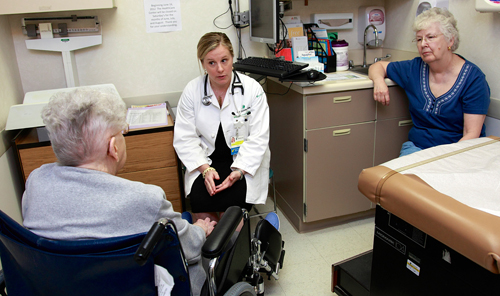New medtech is improving the lives of Christiana Care Health System cancer patients.
Supportive Care of Oncology Patients, or SCOOP, is a patient navigation system using the Aerial Population Health platform. It features an electronic checklist that sets mandatory tasks and milestones during treatment and follow-up, applying a method of care usually associated with advanced cancer to patients with potentially curable cancer.
By following these automated checklists closely, emotionally and financially costly patient emergencies are reduced, according to the data collected from 2016 to 2018 at Christiana Care’s Helen F. Graham Cancer Center & Research Institute.
“The SCOOP protocol is a unique, early intervention tool shown to improve how we treat curative cancer patients effectively, safely and at lower cost,” said Nicholas J. Petrelli, the Bank of America endowed medical director of the Helen F. Graham Cancer Center & Research Institute. “Our experience would indicate that any group of patients at high risk for emergency department visits and hospital admissions could potentially benefit from this kind of approach.”
Christiana Care reported in a press release that, when compared to a control group of similar patients not on the pathway, SCOOP patients experienced:
- Fewer visits to the emergency department (34% vs. 54%)
- Fewer hospital admissions (23% vs. 34%)
- Fewer readmissions (18% vs. 32%)
- An estimated average savings of $1,500 per patient (total cost savings for 207 SCOOP patients through Oct. 31, 2018 was more than $319,000)
How does SCOOP lower these numbers? By adding items to the patient checklist that can be overlooked, such as reminders to assess additional or unmet needs throughout the course of treatment and behavioral health.
“Having that automated process streamlines our workload and helps ensure we don’t miss critical time points for the patient,” said supervising Nurse Navigator Karen Sites, who worked with cancer care management to develop the checklist. “The pathway has helped us to follow a formalized, standard process of care for our patients that starts when they first meet with their cancer care team.”
“The result,” she said, “is better care management throughout their course of treatment with fewer adverse side effects that might otherwise send them back to the hospital.”
Interested in applying for a cancer research trial at Helen F. Graham? Click here.
Join the conversation!
Find news, events, jobs and people who share your interests on Technical.ly's open community Slack

Delaware daily roundup: AI isn't that new; Delaware Earns launches early; Prelude Therapeutics grant

Delaware daily roundup: 20+ things to do in May; Technical.ly's Dev Conference; Dupont earnings

Delaware daily roundup: DE innovation leaders; High schoolers win STEM competition; New Ladybug Fest location


